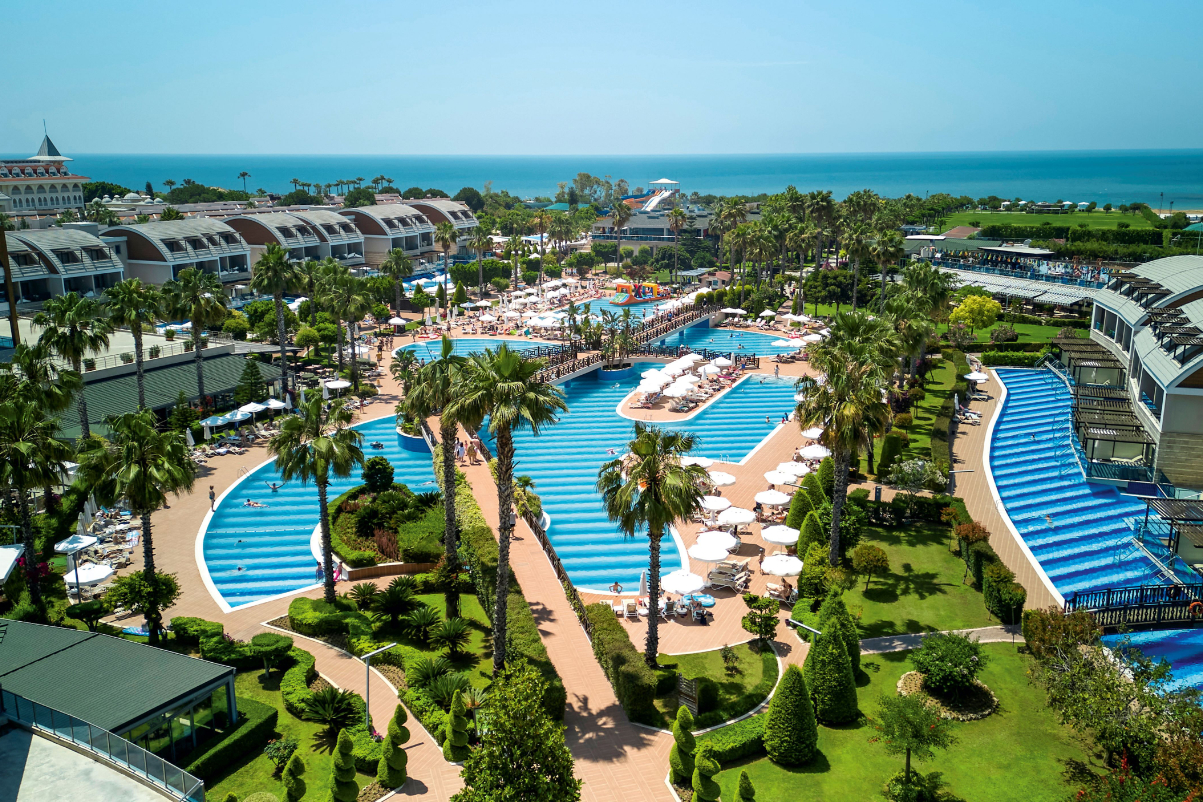TUI's Investor Day: 6 Things to Know About Its Strategic Overhaul

Skift Take
TUI is one of the world's last big vertically integrated tour operators outside of China. The German company used an investor presentation on Tuesday to detail a multi-year strategic evolution for the travel giant.
TUI CEO Sebastian Ebel said Tuesday he has an ambition to reinvent the company as a "global curated leisure marketplace."
Ebel's strategy is to expand beyond traditional package holidays. He essentially aims to open an online travel agency division selling travel a la carte. He also plans to maintain the legacy tour-operating business for as long as it is profitable.
Here are some of the key takeaways we heard during the five-hour presentation.
1. Moving Beyond Traditional Packages
TUI's legacy business is being a jack of all trades. It's a tour operator that runs brick-and-mortar travel agencies, airlines, cruise ships, hotels, and travel experiences (tours, activities, attractions, and excursions).
However, competitive pressure from specialists that aim to do just one thing well — like budget airlines and online travel agencies — has strained its business model.
- More One-Off Selling: TUI is evolving "from being a transaction-oriented company which can sell one package holiday per year to a guest, to a leisure company that could sell a lot more experiences on a lot of occasions to our customers," said David Schelp, TUI's Markets & Airline director.
- Encouraging More Spending Per Customer: The goal would be to sell travel to customers multiple times throughout the year in an a la carte fashion as the customers do weekend leisure trips, midweek business trips, and seek activities to do in their local area.
- More Partnerships: In one partnership test, TUI has worked with Ryanair since February, enabling TUI customers to book Ryanair flights instead of TUI flights. Ryanair cross-promoted the offering, and 40% of customers booking TUI packages with Ryanair flights were new to TUI's resorts and cruises.
2. Unifying Its Flight Business
TUI Group wants to revamp its airline operations, currently Europe's 10th largest fleet with 125 aircraft serving over 180 leisure-focused destinations.
Right now, TUI mostly runs planes to transport travelers to its resorts and cruise ships. But it plans to compete more with the EasyJets of Europe by selling plane tickets to customers only wanting flights.
- Regulatory challenge. It needs to get European authorities to grant it regulatory approval to unify operations. That would enable more operational flexibility, allowing TUI to, for example, "operate a Belgian aircraft with a Dutch crew or with a German crew or a Swedish crew," improving asset utilization and reducing costs.
- Re-organization needed. TUI also needs to centralize back-end operations such as sales, distribution, and revenue management away from five regionally managed units.
- Changes to network planning and operations. Then, it will need to improve the connectivity of its flights through strategic partnerships with other airlines.
- Adopting a new pricing playbook. TUI currently derives about 30% of its airline business from seat-only sales, while about 70% comes from package holidays. The goal is to boost seat-only. It's already implementing "off-the-shelf revenue management systems. It's replacing regional approaches to setting fares and allowing consolidated inventory management across markets.
3. Expanding Its Hotel Footprint
TUI's hotel business has shown post-pandemic resilience and growth, delivering record profits of €668 million (about $720 million) in the 2024 fiscal year. It runs 433 hotels, with a significant presence in the Caribbean and Mediterranean regions, with growing clusters in Africa and Southeast Asia.
- Expansion Plans: TUI has a pipeline of 70+ signed hotel contracts, which will bring its total to over 500 hotels, with ambitions to reach 600. About 44% of this growth is focused on Asia.
- Creating Destinations: TUI's executives believe they can develop destinations "from scratch" by combining hotel development with airline connectivity and distribution. They cited their multi-year growth in Cape Verde as an example.
- Technology Standardization: They've harmonized IT systems across properties and a dozen brands, including property management systems, channel managers, and revenue management systems. This should help them scale their hotel business more quickly, executives said.
4. Stabilizing the Cruise Business
The travel giant operates 17 cruise ships across two brands: Marella, which is focused on serving British customers on trips mainly in tropical destinations, and TUI Cruises, which is a smaller brand and primarily serves Germans with a younger fleet.
- Time for a Face Lift: Executives acknowledged that the Marella fleet is aging significantly, averaging 25+ years old. This presents both operational and strategic challenges. Despite the aging fleet, they said they can maintain profitability for "five years, six years, seven years for heating, maybe up to 10 years."
- Possible Ship Orders: They may have secured slots for two new ships, though this is "not a done deal" yet.
- Alternative Supply Sourcing: They're considering both independent ownership and joint venture options as ways to obtain new vessels, rather than ordering from shipyards outright, because global shipyards are "fully booked out for the next 5 to 10 years."
5. Becoming More Dynamic
Ebel's new strategy for the company has a few key components to reduce risk:
- Adding Inventory More Dynamically: Traditionally, TUI operated on a "wholesale" model, committing to hotel rooms and flight seats well before the season (sometimes 12-18 months ahead). This meant signing contracts and taking financial commitments for specific inventory, which created significant financial risk if demand didn't materialize.
- Reducing Risk: By sourcing components dynamically (purchasing flights and hotels on-demand rather than committing in advance), TUI can expand into new markets without taking on additional capacity risk.
- Selectively Maintaining Differentiation: Rather than becoming just another online travel agency, TUI aims to keep its curation advantage by retaining some wholesale inventory for differentiated products that command higher margins. These curated products serve as the foundation for their marketplace, providing unique offerings that can't be found elsewhere.
- Direct Connectivity: TUI is building direct data connections to hotel and airline partners rather than relying solely on tech middlemen, sourcing when volume justifies it.
6. Selling Travel Experiences A La Carte
TUI's Musement division (its experiences and activities business) is experiencing a notable post-pandemic recovery.
- Profitability Focus: While competitors in the experiences space are "growing very fast but not necessarily very profitable," TUI emphasizes that Musement is "growing fast, maybe less fast, but profitable now."
- Expanding Beyond Traditional Markets: TUI is extending its experience offerings beyond traditional vacation activities (like excursions onshore from a cruise ship) to include more urban and local experiences (like candlelight concerts in churches) to maintain customer engagement outside of main vacation periods.
CORRECTION: The article has been updated to correct David Schelp's name.
Cruise and Tours Sector Stock Index Performance Year-to-Date
What am I looking at? The performance of cruise and tours sector stocks within the ST200. The index includes companies publicly traded across global markets including both cruise lines and tour operators.
The Skift Travel 200 (ST200) combines the financial performance of nearly 200 travel companies worth more than a trillion dollars into a single number. See more cruise and tours sector financial performance.





